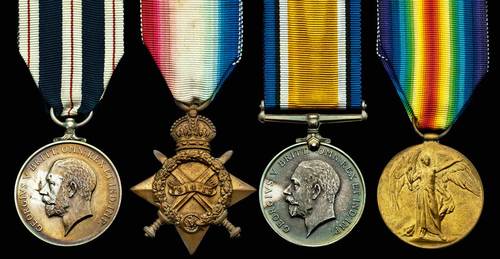
Auction: 323 - The Numismatic Collector's Series Sale
Lot: 781
A K.P.M. Group of Four to Police Constable Walter Bush, Metropolitan Police, Late Middlesex Regiment, For Arresting the Assassins of Field Marshal Sir Henry Wilson, Murdered Outside His House in London by Two Members of the Irish Republican Army, 22.6.1922
a) King's Police Medal, G.V.R., 1st 'coinage head' type (P.C., W. Bush. Metropolitan Pol.), with Gallantry riband
b) 1914-15 Star (L-12014. Pte. W. Bush. Middx. R.)
c) British War and Victory Medals (L-12014 Cpl. W. Bush. Midd'x R.), nearly very fine or better (4)
K.P.M. London Gazette 1.1.1923 Walter Bush, Constable, Metropolitan Police.
The Recommendation states: 'This officer was off duty in his shirt sleeves in Gerald Road Police Station when he heard armed men were holding up a crowd in South Eaton Place. Without stopping to put on his tunic he at once went in a taxi to Ebury Street where he saw two armed men (the murderers of Field Marshal Sir Henry Wilson). O'Sullivan, one of the men, fired twice into the crowd and a truncheon was thrown which hit him on the head. The Constable, seizing the opportunity, rushed at O'Sullivan and caught him around the body. O'Sullivan became violent and Bush threw him to the ground, forcing a revolver from his right hand. The crowd then came to the assistance of Bush and the prisoner was taken to the Station. The revolver was found to contain four live and two spent cartridges. While Bush was struggling with O'Sullivan the second man took deliberate aim at the Constable but fortunately the revolver misfired.'
Police Constable Walter Bush, K.P.M., was born in Tottenham, Middlesex, in September 1892, and enlisted in the Middlesex Regiment in September 1907. He served with the 3rd Battalion during the Great War on the Western Front from 18.1.1915, and subsequently in Egypt and Salonika, and was promoted Corporal. Discharged, 15.4.1919, he joined the Metropolitan Police, 11.8.1919, and was posted to 'B' Division.
Murder of Field Marshal Sir Henry Wilson
On the morning of the 22nd June 1922, Field Marshal Sir Henry Wilson, Bt., G.C.B., D.S.O., an Irish-born former Chief of the Imperial General Staff, and recently-elected M.P. for North Down, was returning to his London home in Eaton Place. He had just unveiled the War Memorial at Liverpool Street Railway Station. He had paid his taxi driver, and was feeling for his keys, when two men came up behind him, pulled out revolvers, and shot him down. With an arm wounded by the first two bullets he half drew his sword, but was shot a further seven times before the two murderers attempted to escape. Wilson's body was carried into his house and laid out in his study. Mr. (later Sir) Bernard Spilsbury, the famous pathologist, arrived at the scene and carried out his examination of Wilson's body. He had been shot in the left forearm, twice in the right arm, twice in the left shoulder, in both armpits, and twice in the right leg. Both armpit wounds had fatally pierced his lungs. The two suspects were identified as Reginald Dunne and Joseph O'Sullivan. Both were members of the Irish Republican Army and aged 24 years old. O'Sullivan had lost a leg at Ypres in the Great War, and this had hampered his escape from the scene. Instead of fleeing from the scene on his own and possibly making good his escape, Dunne stayed to try and aid O'Sullivan.
Both suspects were tried together for the murder of Sir Henry Wilson at the Old Bailey on the 2nd July 1922. Found guilty, they were sentenced to death by hanging, and were executed at Wandsworth Gaol on the 10th August 1922. Buried within the prison grounds, in July 1976 their bodies were exhumed and repatriated to Ireland and reburied in the republican plot at Deans Grange Cemetery. Sir Henry Wilson was buried with full military honours in the crypt of St. Paul's Cathedral, London. As he had no children the baronetcy became extinct upon his death. Later testimony suggests that Wilson's support of Orange Lodge action against Roman Catholics in Northern Ireland, as well as his general pro-Unionist view, was the reason why he was targeted, and that the order to assassinate him came directly from Michael Collins.
Police Constable Walter Bush was awarded his K.P.M. by H.M. King George V in a ceremony at Buckingham Palace on the 15th February 1923. He remained in the Metropolitan Police, later transferring to 'X' (Kilburn) Division, and retired in January 1945.
Sold for
$4,250




